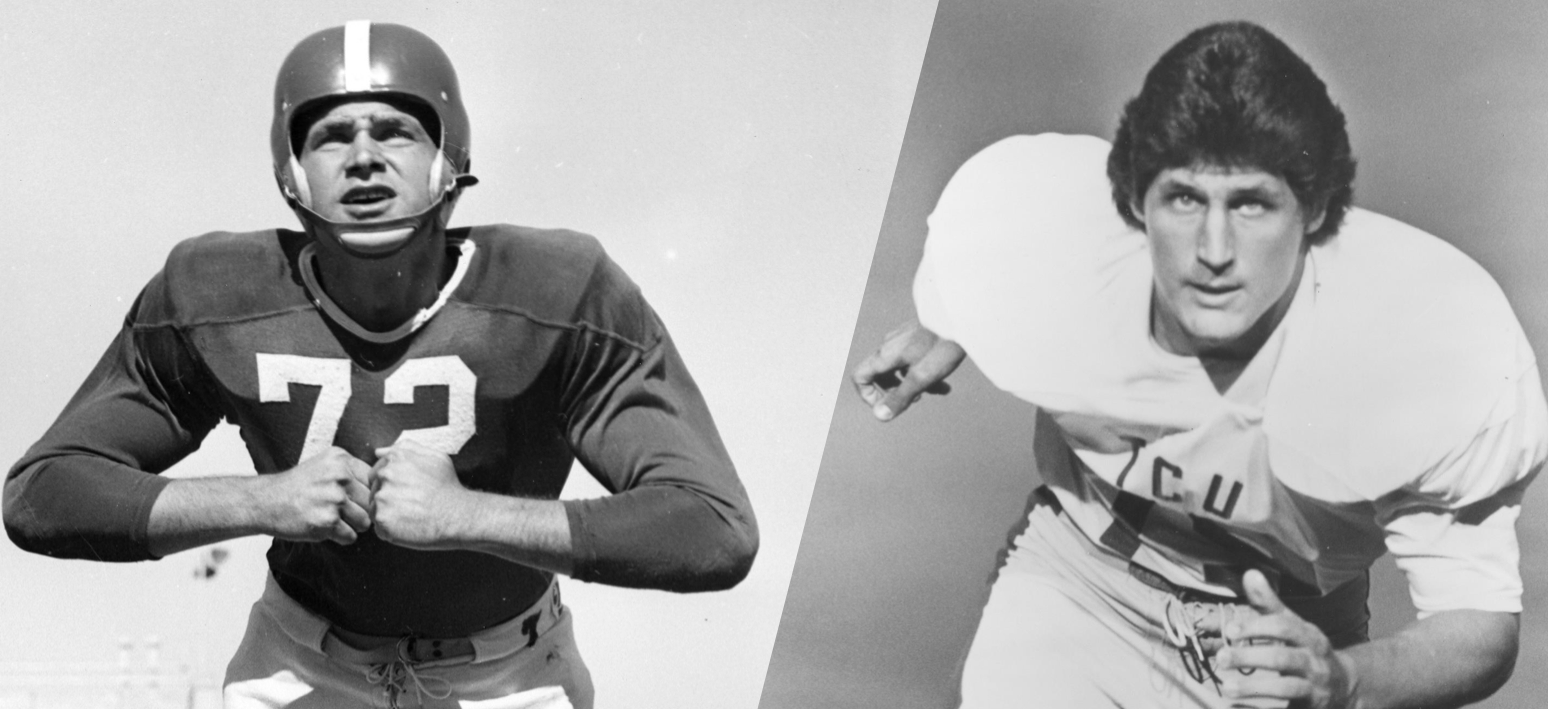
Following in Frog Footsteps
The Harris family shares lessons learned on the gridiron.
Before every home football game, Marshall “Gator” Harris ’54 (MLA ’77) arranges tables and chairs for a tailgate party he started in the 1970s. The menu, designed by his wife Marlene Schnellenbach Harris ’56, varies to suit the weather and kickoff time. Some recent fare originates from the kitchen of their son, Marshall K. Harris ’79.
Gator played offensive tackle for Coach Leo “Dutch” Meyer’s final TCU football teams. His son, Marshall K., was a defensive tackle during the 1970s stretch of one-win seasons. Both are members of TCU Lettermen’s Hall of Fame, and both were Academic All-Americans. They are the only father-son duo in Horned Frog history to achieve either distinction.
At tailgates, the elder Harris greets visitors and discusses the successes of Coach Gary Patterson football era. The younger Harris prefers to hang back and take it all in from under a sturdy old shade tree.
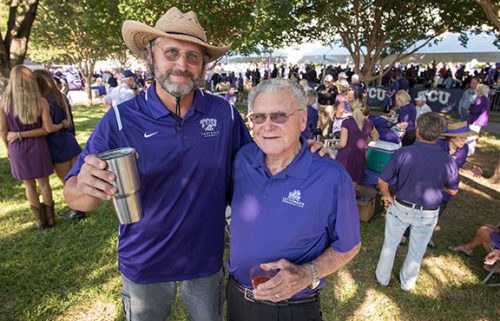
Marshall “Gator Harris and son Marshall K. Harris celebrate at the family’s “Furious Frog” tailgate party during Homecoming Weekend 2016. Photo by Glen E. Ellman.
From the football field to the battlefield
A visit from a family friend who worked in the Fort Worth oil business convinced the elder Harris to leave his native Deland, Fla., for the postwar possibilities of Texas. Harris remembers the man’s sales pitch. “TCU has a lot of country boys, just like you,” he said. “I think you’d fit in real well.”
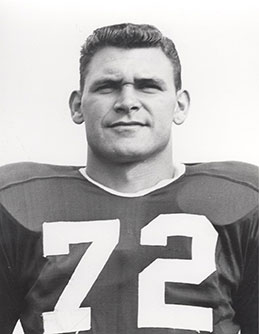
Marshall “Gator” Harris ’54 was a four-time Academic All-American. Photo courtesy of TCU Athletics.
In 1949, an 18-year-old Harris arrived at TCU, then populated by many World War II veterans who lived in army-style barracks on the east side of campus. Gator’s football career is a scrapbook of highlights, including a Cotton Bowl appearance and a championship trophy from the Southwest Conference. Excellence in geology studies netted him four consecutive appearances on the brand-new Academic All-America team.
In 1955, after one post-graduation year in West Texas oil fields, Harris was commissioned in the Air Force. His military career led his family to several states during the next 20 years. He once trained pilots for the country’s first nuclear strike program.
The Air Force sent Harris twice to Vietnam, where his duties included refueling fighter jets mid-air and flying those killed in battle to the military mortuary in Da Nang, he said. “[I] hated that worse than anything else.”
Unwilling to deploy a third time, Harris retired from active duty in 1976 and joined his family in Fort Worth. He and Marlene bought TCU football season tickets on the 40-yard line and started tailgating with friends behind the north end zone. Being home allowed the elder Harris to watch his son play football at Fort Worth’s Southwest High School.
A tackle and an artist
The younger Harris said his parents never pressured him to play football for their alma mater. He accepted a football scholarship to TCU because of its fledgling, “scratch-built” art department.
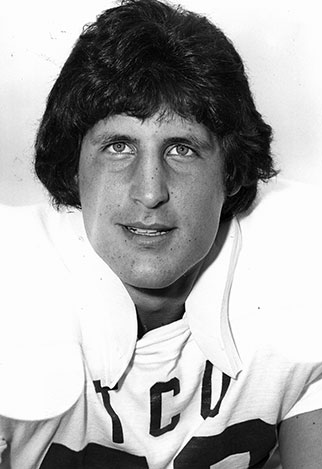
Marshall K. Harris played several seasons in the NFL after his TCU football days. Photo courtesy of TCU Athletics.
The 1970s football Horned Frogs were cellar-dwellers. In the younger Harris’ four years, the teams won just four games. His parents were always there and waited outside the locker room to console him after the losses.
“He was usually the last one out,” the elder Harris said.
Marshall K. planned to hang up his cleats after college, but one night he received a surprise phone call. The New York Jets had picked him in the NFL draft.
His reaction?
“Damn it.”
The younger Harris never played for the Jets but did spend several years with the Cleveland Browns and New England Patriots. He carried a constant fear of being cut, thus unemployed. He was “worried about everything and nervous and scared.”
When Marshall K. was let go from his final team, the younger Harris returned to his artistic aspirations. He settled in Boston, working in the advertising industry. Although he was successful, Marshall K. said his NFL anxiety persisted into his new career.
Looking back on his life, the younger Harris said participating in the losing TCU football program of the 1970s riddled him with self-doubt. “It was damaging,” he said. “It took a long time to sort of un-program that you’re not very good at what you do.”
In 2010, Marshall K. reached a breaking point. “I was emotionally and financially bankrupt,” he said. He left the Northeast and returned to Fort Worth, where his most faithful supporters – his parents – were waiting to offer encouragement.
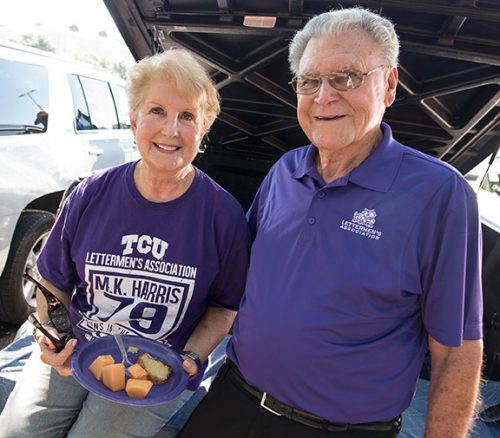
Marshall and Marlene Schnallenbach Harris. (photo by Glen E. Ellman)
Using family resources as a base, the younger Harris reinvented himself as an original, noncommercial artist. “I embraced the thought process that I can have that peace of mind as an artist,” he said.
Marshall K. won the prestigious Hunting Prize in 2013 for a graphite drawing of a western saddle. He also reconnected with and married a college pal, June Naylor Harris ’79, a journalist.
In June, Marshall K. showcased his art at the new Fort Works Art studio, co-owned by J.W. Wilson ’00, another football letterman. The show included graphite sketches of a revolver, a black Mary Magdalene and a 20-foot cloudscape with almost 5,000 obituaries hanging above on toe tags.
“I know that the majority of work in this show will not sell,” Marshall K. said, “but I didn’t create it so it would sell.”
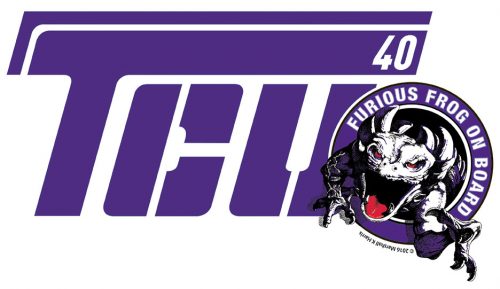
Marshall K. Harris created the “Furious Frog” tailgate party artwork as well as the famous “Flying T” logo. (Image courtesy of Marshall K. Harris)
Family football time
During a midseason tailgate in 2015, Marlene Harris offered visitors her son’s homegrown pickled cucumbers. Her husband greeted visitors, discussed Frog sports and bragged on granddaughter Ryan Smith ’13, who played soccer for the Horned Frogs.
Occasionally, the elder Harris said, former players stopped by hoping to hear stories about executing Meyer’s legendary spread formation. Those guys know the peaks and valleys of TCU football history, he said, even if some of their contemporaries believe the pre-Patterson Frogs “never won a game.”
The elder Harris shared a life lesson he learned from Meyer. “When it looks very difficult, if you keep on and don’t give up, time after time, circumstances will change and you’ll be able to accomplish what you came to do.”
The younger Harris, however, said he divined a different wisdom from watching the football program return to glory, and from his family. “The team that pulls together can do miraculous things.”
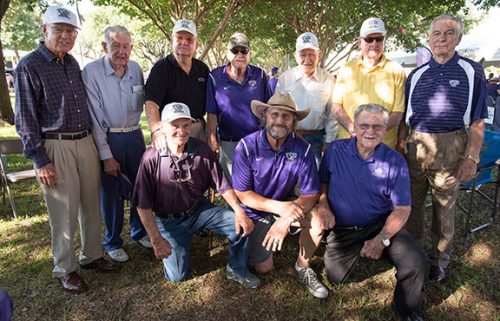
Marshall “Gator” Harris ’54 (MLA ’77) and Marshall K. Harris ’79 gather with several of the elder Harris’s 1951 Southwest Conference football championship teammates during the Harris family’s tailgate party on Sept. 17, 2016. (photo by Glen E. Ellman)

Your comments are welcome
1 Comment
Never met Marshall but swam with his sister at the Panther Boys Club in Ft. Worth. Marshall’s father sat with my father during swim practices and they became pretty good acquaintances. Ironically my Uncle Job Bob Craig went to TCU with Mr. Harris back in the 1950’s. My Uncle was a SWC long jump champion back in the day! Great to read about the Harris’, nice family. Thanks!
Related reading:
Features
Politics 101
Students appraise the political landscape
Campus News: Alma Matters
Q&A with … Sara-Jayne Parsons
Curator for the Art Galleries at TCU.